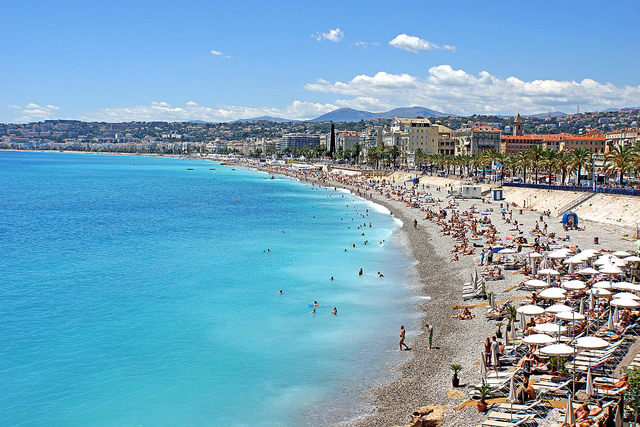
The beat
Maduro flexes his muscles
After four months of street protests about the Venezuelan government, another bloody episode of clashes between protesters and state power occurred on Sunday. Several people were killed in the protests, which followed elections for a constituent assembly that could overhaul the state institutions. The US earlier imposed more sanctions on high-ranking officials entangled in the nation’s web of organised crime, and froze President Maduro’s financial assets following Sunday’s violence. That didn’t prevent him from having two leading opposition leaders arrested by state security agents.
EU versus traffickers
The EU extended and amended the mandate for the mission aimed at stopping human trafficking in the South Mediterranean (EUNAVFOR MED Operation Sophia) until the end of 2018. Under the mandate, the EU trains the Libyan coast guard and navy, and enforces the UN’s arms embargo. Expanded permissions now include the ability to share intelligence with Frontex, Europol, and member states’ law enforcement agencies.
Chinese meddling
Indonesian police have exposed a group of 149 Chinese and Taiwanese nationals allegedly running an online fraud system against victims in China, which accumulated US$450 million. Indonesian officials underlined the troubles they still face with monitoring foreigners in the country. Another example of Chinese involvement in questionable dealings was revealed closer to home, when a ‘Sydney crime figure’ was exposed as a middle man in a small-arms deal between the Chinese state-owned firm Norinco and militants in the Middle East.
CT scan
The push to Raqqa
This week ISIS claimed responsibility for an attack on the Syrian Democratic Forces (SDF) that killed 53 people near Raqqa, Syria. The SDF, a combined force of Kurdish and Arab fighters with US backing, is conducting a campaign to take Raqqa, which has been held by ISIS since 2014. The offensive is progressing well: 40% of Raqqa has been captured and the attacking forces haven’t faced ‘any significant counterattacks’.
Foreign Terrorist Fighters Strategic Forum
Attorney-General George Brandis has met with ministers and senior officials from Brunei, Indonesia, Malaysia, New Zealand and the Philippines to discuss the growing threat of extremism in the region. The ministers agreed to hold a dialogue hosted by the Australian Federal Police and the Indonesian National Police, and to establish a Foreign Terrorist Fighters Strategic Forum to foster intergovernmental cooperation and information-sharing.
Survey says: ISIS is the biggest threat
People believe ISIS is the greatest threat to national security, according to a survey conducted by the Pew Research Center that spanned 38 countries. The results showed significant regional variations, but ISIS narrowly edged out climate change to take the mantle of top threat. People in the Middle East, the US, Europe and Southeast Asia were most concerned about ISIS.
Checkpoint
Asylum seekers turned away from Israel
An interesting insight into the lives of African asylum seekers in Israel is captured in the short video Unwelcome Stranger. While the asylum seekers escaping brutality and ethnic cleansing in Sudan and Eritrea were initially considered to be temporary residents, their standing has since changed. Some have since been placed in detention, while others were deported to other African nations.
Boy dies after drinking liquid methamphetamine
A disturbing video has emerged of US Customs and Border Protection officers at a border crossing in California appearing to encourage 16-year-old Cruz Velazquez to drink liquid methamphetamine. The video shows the officers gesturing at the boy to drink the yellow liquid from a plastic water bottle, which his family lawyer believes was given to him to carry across the border. The concoction proved deadly for Velazquez, and his family has since filed a lawsuit against the officers.
Russia send troops to NATO border
Russia is planning a series of military exercises near the eastern NATO border, according to the New York Times. While the exercise isn’t reported as a retaliation against the ‘sweeping new economic sanctions on Russia that Congress passed last week’ , there’s some concern from the US about the motivation behind the exercises and the duration of the operation.
First responder
Eritrean children flee because of national service
Yobieli, a 12-year-old Eritrean child, fled his home for Cairo in August 2016. He made the journey alone and on foot, through deserts and across nations. Thousands have made the same journey to escape poverty in Eritrea. Curiously, national service is largely to blame for Yobieli’s hardship. His father was subject to the Eritrean national service, which on paper has an 18-month conscription period, but in practice lasts indefinitely, with little to no salary. Yobieli now faces a choice between risking a trip through ISIL territory or waiting for a place in Europe which may never come.
Border wall: an environmental catastrophe
Rice University ecologist Scott Egan wrote an op-ed this week detailing the environmental effects of President Trump’s proposed border wall. More than 100 endangered species would be at risk if the wall were built because it would create a population bottleneck and lead to increased inbreeding. Perhaps Silicon Valley’s proposed ‘smart’ wall consisting of drones and border police (instead of a physical barrier) has more merit than just being significantly cheaper.
Fiery retreat
Last week 12,000 tourists in the French Riviera were evacuated from the beach due to a 4,000-acre wildfire. Sympathy for the holidaymakers will be hard to find among those of us (me included) who are currently sitting at our office desks.

